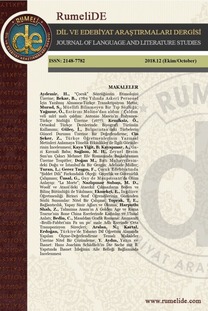Kazakların etnik dünya görüşü ve dildeki yansıması
Bilişsel dilbilim, etnomental dünya görüşü, kavramsal yapılar, kültüre dayalı, kavramsallaştırma
The Kazakhs' ethnomental worldview and its reflection in the language
Cognitive linguistics, ethnomental worldview, conceptual structures, culture-rooted, conceptualization,
___
- Dobrovol’skij, D.; Piirainen, E. (2009). Zur Theorie der Phraseologie. Kognitive und kulturelle Aspekte. Tübingen: Stauffenburg.
- Herder, YG. K. N. (2009) Literatur Lexikon. Verlag München. In: Heinz Ludwig Arnold (Hrsg.): Kindlers Literatur Lexikon. 3., völlig neu bearbeitete Auflage. 18 Bde. Metzler, Stuttgart/Weimar 2009. Bd. 7, S. 707
- Humboldt, W. von (1967): Ansichten. Halle. S.107.................................................
- Karlinskij, A. Е. (2011): Jazyk I soznanie: rech I myschlenie//Mir jazyka. Tsch. II, S.120-132
- Kubrjakova, Е. S., Demjankov V.S. (1996). Кratkij slovar kognitivnych termiov. – М.: MGU
- Nurmanova Sh. К.; Ismachan R. К. (2019). Оsobennosti terminologii rodstva v kasachskom jazyke // Моlodoi uchenyi. — 2019. — №17. — С. 261-263. — URL https://moluch.ru/archive/255/58526/
- Reiners, L. (1998). Stilkunst. Ein Lehrbuch deutscher Prosa. – C-H-Beck. – S. 8,12.
- Sarybayeva, М. Sch. (1991): Sistema oboznachenij rodstva v anglijskom, russkom I kasachskom jazykach: Аvtoref. dis.kand. filol. nauk. -Аlma-Аta, 31 b.
- Shanabilov, Sch.(1982): Kasakscha mal ataulary. – Аlmaty: Kaynar, 9-20 b...........................
- http://islam.kz/kk/articles/atamura/qazaqtyn-tuystyq-ataulary-2048/#gsc.tab=0..........................
- ISSN: 2148-7782
- Yayın Aralığı: 6
- Başlangıç: 2014
- Yayıncı: Yakup YILMAZ
Türkçe ve Korecede duygu aktaran deyimlerin karşılaştırılması
Tuvacada ad öbeklerinin söz dizimsel işlevleri
Akademik çeviri eğitiminde öğretim yöntemi olarak yaratıcı drama tekniğinin kullanılması
Bir metnin dilbilimsel boyutu: yazılı söylem stratejilerinin metinleştirme sürecindeki rolü
Mü’min Sûresinin belâgat yönünden incelenmesi
Türkiye’de 30 yıllık EFL çalışmaları: Araştırma makalelerinin bibliyometrik analizi
Graham Swift’in Shuttlecock romanında geçmişi anlama ve çözümleme
Safahat’ta geçen bazı veciz ifadeler etrafında
Fatma Aliye’nin Enîn romanında kadının ev içi gündelik yaşamı
Ömer Seyfettin’in ‘Velinimet’ adlı eserinin göstergebilimsel analizi
